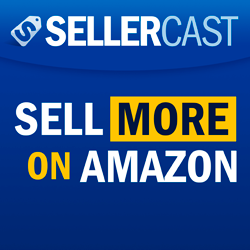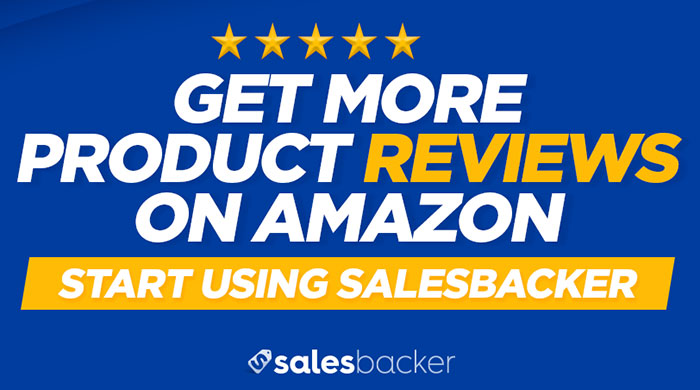 Direct podcast MP3 download link
Direct podcast MP3 download link
Like the show? Get new episodes on iTunes or Stitcher
In today's episode Kindra joins the show to talk about her goals for breaking free from her job to run her ecommerce business full time. At $10k per month in sales with just one product and two more on the way she's got a great start to reaching her goal.
Kindra also has a great relationship with her supplier to the point where her supplier actually read her product reviews and made a suggestion to improve the product that she moved forward with.
Want to ask a question?
Get involved and ask a question about selling on Amazon and Chris may answer your question live on a future episode of Sellercast. Also, if you think you'd be a good guest for the Sellercast podcast feel free to tell us more about you and your company here.
Need more product reviews?
If you'd like to get more reviews for your products on Amazon check out Salesbacker.
Podcast Transcript
Intro: Hello everyone, Chris Guthrie here, host of Sellercast. And in today’s episode, I speak with Kindra, who’s been selling on Amazon since middle of 2015. Kindra has a very unique relationship with her supplier, to the point where a supplier actually read one of her reviews and then suggested a change on one of her products, and they went forward with that change. It’s a really interesting story. She talks about that as we get into this podcast. And with just this one product, she’s had about $10,000 per month, with two more products on the way coming up very shortly. I enjoyed this conversation, and I think you will as well. So let’s start the show.
=====
Chris Guthrie: Hello everyone, Chris Guthrie here, host of Sellercast. In today’s episode, I have Kindra here. Welcome to the show.
Kindra: Thank you, Chris. Thanks for having me.
Chris Guthrie: Yeah, so let’s get into this. For how long have you been selling on Amazon? And then we’ll talk about your business and some of what you’ve learned along the way as well.
Kindra: I went live on August 5th of 2015. So I’ve been selling for about seven months now, right?
Chris Guthrie: Okay, yeah, that’s great. So where are you at sales-wise?
Kindra: Well, I actually just got my 1099-K a couple of days ago, and it’s about $21,000, actually, more like $22,000 in total gross sales.
Chris Guthrie: Yeah, so for the month of January then, where do you think you’re at now?
Kindra: The month of January, it’s about $10,000.
Chris Guthrie: Okay, great. So the first few months, of course, were lower. And then you started to really ramp it up. So that’s great. So $10,000 or so a month now.
Kindra: Yeah, it was actually a point where I was like, “I don’t know if I’m going to sell anything,” to “Oh gosh! I need to order more inventory.” [Laughs] And it happened within like two months of starting out. So I was really pleasantly surprised.
Chris Guthrie: That’s great. We’ll deconstruct how and what you’re doing to get there as we go along here. But let’s begin with what you were doing before you started selling on Amazon.
Kindra: Well, what I had been doing is what I’m currently doing now, which is my day job. I’m a Travel Demand Modeler. And the best way I can describe that is that a meteorologist forecasts the weather, and a travel demand modeler forecasts how much traffic there’s going to be in the future on streets network. So I deal a lot with data analysis and computer simulations and modeling.
Chris Guthrie: Interesting, very interesting. Okay, so then what made you decide to start selling on Amazon?
Kindra: Well, there are a lot of reasons, but I guess the primary reason for me was just to have more time, to be more flexible with my time. And I really love the outdoors. I live in the Pacific Northwest. I love being outside. And I’m also kind of a semi-pro photographer. So I love being outside, taking photography.
And I was getting to the point where… I’ve been in the public sector for about 13 years now, and you spend a lot of time at a desk in front of a computer. And I saw this as a way of freeing up some time so I could do more things that I really enjoy doing.
Chris Guthrie: Oh, that’s great, yeah. Yup, I love it up here in the Pacific Northwest as well [laughs]. Definitely, you’re thinking about the next snowboarding trip. So that’s awesome. Cool, now is private-label products the only thing you’ve been doing? Or were you also reselling or doing anything else in terms of selling on Amazon?
Kindra: Yeah, private label is the only thing I’m doing right now. In future, I’d like to move into digital products. Back in my college days, I did dabble a little bit with Internet marketing, back in the wild wild west days of Internet marketing. This was like 1999 through 2003 [laughs]. So I was kind of greenhorn in a lot of ways, not just from an Internet marketing standpoint, but just simply from a self-discipline point of view. And I think that in retrospect, knowing what I know now, I could probably kill it in Internet marketing right now. Knowing what I know now, Amazon bestselling has really opened my eyes to a lot of different possibilities that I didn’t really see back in the day. And I think a lot of that just had to do with my personal development more than anything else, to be honest. So private label is the only thing I’m doing right now.
Chris Guthrie: Okay. So the digital products you were thinking about selling, that would be within your specific niche you’re selling on Amazon?
Kindra: Yeah, it would probably start with my niche, simply because it’s the lowest barrier to entry for me. I would like to sell a children’s book at one point, get into Kindle books because it’s the same kind of business model in terms of getting reviews and marketing your product. It’s really the same model. It’s just that it’s in the book space instead of private label. So I’m really interested in learning more about that and developing some ideas I’ve had on the back burner for quite some time now. I love to write. I’m kind of an easy-going person and kind of a child at heart. So I wanted to really use that medium as a way of getting myself out there.
Chris Guthrie: Oh, that’s great. Yeah, I think that the thing too that a lot of people that are newer, those that are starting selling, seem to forget about – maybe, people who’ve been selling longer don’t think this – is that selling on Amazon is just one of many different marketplaces you can potentially sell really anything. You can sell your products on other channels, your own website etc. But there’s so much traffic on Amazon. That’s just where a lot of the discussion is focused at. That’
So then what about your goals for this type of business? You’re doing about $10,000 a month now. What are you trying to do as you head into… Are you trying to scale it up and then eventually sell? Are you looking to try and get to a certain number of products? With everyone I’ve talked to, it’s different. And I know for the last couple of episodes, I’ve talked to people that have around the same amount of experience in terms of how long they’ve been selling. So I’m curious to see what you say.
Kindra: Yeah, for me, my primary goal for my business is to scale. I quickly realized just through Amazon selling community – and it’s such a great community – that to really succeed… I mean everyone has different quantifiers for success, right? But for me, it’s basically breaking free of that 9:00 to 5:00 grind. And for me, basically, that means getting about 5 to 6 products, yielding about the same amount as I’m yielding right now in gross profits per month. So if I can do that, for me, it’s just a matter of scaling to the point where I can break free of the lifestyle that I’ve had for almost two decades. So for me, it’s just a matter of scaling up to that point. I don’t really have a hard-and-fast number in terms of how many products it’s going to take. If it takes 6, that’s great. If it takes 10, fine. I just know that if I replicate what I’m doing right now, it’s going to work. I have that much confidence in the system and in myself as a seller right now that I know I can do it. So it’s not a matter of if; it’s just a matter of when.
Chris Guthrie: Yeah, certainly, once you do make that leap, you’ll have additional time to be able to do more as well. So that’s great.
Kindra: Absolutely.
Chris Guthrie: Okay, so then about how much time are you spending on the business? You mentioned you’re in the … for future traffic and all that right after your day job. But how much time are you spending on your Amazon business?
Kindra: It really varies. At the beginning, I was putting in probably 25 to 30 a week on it – just because I was learning and I was trying to assimilate as much information as possible. Now I’m doing maybe 10 to 15. Now it’s kind of inventory-specific where if I have an inventory order coming in and I need to get all that processed out and I need to give stuff to my supplier and I need to give them packing designs and images and getting product listings up and all that, then I put in a little bit more time. But in actuality, I think I’ve spent less time now than I did in the past on it because a lot of it is replicable. You can copy and paste customer service replies and all that. So I’ve created kind of a good system that works within the scheme of my current workflow, so that I can kind of optimize my time a bit better.
Chris Guthrie: Okay, that makes sense. And you mentioned before. It sounds like you have just one product right now. Is that correct?
Kindra: Right, just one. That’s correct. I have two in production right now that should be ready by the end of Chinese New Year. So I have two in the pipeline, but I only have one that’s actually selling right now.
Chris Guthrie: Yeah, yeah. And then what are your initial inventory orders you’re planning on doing for these new products?
Kindra: One is actually kind of a variation on my original. So I’m doing a thousand for that one. And I’m doing a 500 for a completely different product that’s in the same kind of niche as my other two products but completely different. So I’m doing 500 for that one because it’s in unfamiliar territory, and I’m not too sure how well it will perform yet. So I want to minimize my risk a little bit more on that one.
Chris Guthrie: That makes sense. So along the way then, with your own product, what are the problems you’ve run into? Are there any specific mistakes that you made, and then maybe what you learned from this?
Kindra: No, I really lucked out [laughs]. I lucked out from the product selection to finding the right supplier. I didn’t run up against any problems with quality or any of the kind of the common problems you would typically come up against with the first product. I think the only mistake I really made was probably not ramping up my reviews, I mean getting the customer feedback and getting my promos out and really priming that pump at the onset because I was so unsure about whether or not I would just sell one. I was so focused on just selling that one, and within the day, I had already sold one. I mean it was to a friend, but who cares? Amazon doesn’t care. A sale is a sale. And from that point forward, I mean it only took me about a month to quickly realize that if I really wanted to make some sales, I was going to need to get reviews.
So then after a month of kind of being somewhat wishy-washy on getting reviews, I made a concerted effort to kind of light a fire in myself and say, “Okay, I need to get this done. Go seek out some VIP reviewers. Get some top-1000 reviews in. Get some video reviews in. And really make that concerted effort to get that going. And once I hit the 15-review point, it was lights out. I mean it was really a matter of just getting those 15 initial reviews in. And once I had that, I gained traction on my product. And I haven’t had any real slowdown in sales since then.
Chris Guthrie: Nice, and you’ve been just stacking more organic reviews and everything else on top of that?
Kindra: Right. I’m trying to think off the top of my head how many actual promo giveaways I did. And I think I only did maybe 20 altogether. And those 20 were kind of quasi. They weren’t 100 percent off. They were discounted, and they were scattered, so that some were 50 percent. Some were 75 percent. There wasn’t really any set percentage in terms of promo discounted off. I kind of mixed it up a little bit because I was still kind of uneasy about how Amazon was going to interpret the reviews.
During my launch phase, it was the time when Amazon came out with its whole TOS changes. It was like in September. So it was like great, I’m just getting started, and then they had to change in terms of service. So now it’s just like okay, they’re no control over when they’re going to change it. It’s going to happen. So just throw out the punches. But at the beginning, when you’re starting off, you feel like you’re walking on eggshells. You don’t know what’s going to happen. You feel like every single little move we make is scrutinized. So I was a little apprehensive at the beginning.
But now I just want my reviews, get them as fast as possible. I got them. Okay, good, now I can move on to the next phase.
Chris Guthrie: Yeah, I think that’s the thing too. Everyone should know this by now. Once I start selling, especially if I’ve done any other business in the past, the only thing that’s remained constant is change. Everything is always constantly changing. So you’ve got to be adapting. And frankly, I think that’s where half the fun is with any business. It’s just being able to change and adapt strategies and trying new tactics and everything else.
Your very first product is doing well. $10,000 a month is great. And a lot of people that are listening – whether they’re new and just starting out or they’re experienced sellers – they probably would like to have an actual product in for $10,000 a month. So what did you do to find your product? Was there something specific or different that you did in terms of finding the product that you went with?
Kindra: I was initially looking for something between 500 and 5000. And I’d like to say, I didn’t really choose my product; the product chose me. And that sounds kind of cheesy, but…
Chris Guthrie: [Laughs] I wasn’t going to say this.
Kindra: But it was a matter of finding. I just developed a list of products that were all within a certain range and that had a good sales volume and used merchant words to kind of cross-analyze what the traffic was going to be like for that particular product.
I’m in the home and kitchen space. It’s one of the biggest spaces on Amazon, next to consumer electronics, I think. So I knew that if I picked something within the 1000 to 2000 range, I was still going to be getting a good sales volume in. And the particular product I have, there was no problem with the amount of search volume coming into that for that particular product. My product is a very popular product. So I didn’t see anything in. The thing is that I didn’t really want to pick anything that was too low in the BSR range, simply because I wanted to give myself a really good opportunity to succeed. And I knew that if I were to enter a highly competitive product or category, I would reduce my chances of succeeding. And from a personal point of view, that initial success for me, it was very important to see that it was validation that I was doing something right. So I wanted to minimize my risk as much as possible. So that was just the strategy from my point of view.
In retrospect, I probably … for something that was lower, knowing what I know now [laughs]. But seven months ago, I wasn’t as confident.
Chris Guthrie: And when you say lower, do you mean as in more sales?
Kindra: Right, a lower BSR. I know, it’s always backwards.
Chris Guthrie: Yeah, and that’s great though. You get the first one out, 1000-2000 range, in a bigger category. And then you get some initial traction. And you can use that to go into the next thing. So that’s great.
The other question too I was curious about is along the way when you were doing your research, were there any products or categories that you specifically just thought, “Okay, there’s reason I don’t want to go into those.” And this could just be from your own thought process. Or you had experience trying to source the product from there before you got some samples or something, just something that can help people that are thinking about what they’d like to do.
Kindra: Yeah, for me, it was a matter of once I came up with a short list of products, I could easily say, “Uh, this product I can’t get behind.” I didn’t have any sort of emotional connection with it. And I feel like when you’re starting out, it is important to have some sort of emotional passion for whatever you’re selling because it gives you a better perspective on what your customers are going to want. Then you’re able to brand it more effectively to the consumer.
Now once you’ve developed that brand, then you can add products to that brand. And you may not be as emotionally connected to it. But if it’s in that same category, you can kit that brand, and you can cross-sell and cross-promote those things. And then you’re not married to just… They say don’t become married to your product, right? I wholeheartedly agree. You shouldn’t be married to a product; you should be married to your brand because otherwise, there’s no incentive for you to move it to the next level. If you want a multi-million-dollar brand, then you need to project it in a way that people are going to be able to connect to emotionally because a lot of people’s purchases are based upon emotional connection, not so much a physical connection. It’s like you need to push their buy button. So how are you going to do that? You need to connect with them in an emotional way. So if you can interject your own passion into that, then it’s a lost cause. You may see some initial success, just simply because it’s a popular product. But if you want to really expand the brand to something bigger, then you’re going to have to put a little bit more effort and kill it.
Chris Guthrie: Yeah. So then along that way, what did you do to help distinguish your product from your competitors’?
Kindra: Basically, I listen to the customer. I’ve used the product myself, so I know how to use it. I know what it’s used for. I know what it’s good for. I know its strong points. I know its weak points. And I go on blogs. I go on forums. I troll my customer review page. I troll blog pages. And I just read what they’re talking about, about my product itself and also about the category it’s in. And I’m constantly learning about it. Then I convey those things to my supplier. I also have probably the best supplier on the earth, I think.
My supplier checks in on my product on Amazon. They read reviews. They actually created a modifier to my product based upon one 4-star feedback review that they read on my page. They’re like, “Hey, the customer brought this up. We can do this for you.” And it only will cost you about 30 cents more to the unit cost. And let’s do it [laughs]. Actually, that’s a whole story in and of itself. It’s kind of opened up the can of worms for me. But I’m working through that, and it’s not a big deal. I mean it’s going to end up being great for my product in the long haul. But I’m just constantly keeping up with what the trends are in my category and really reading what the feedback is from my customers and interacting with them and making sure that their needs are taken care of, and then just conveying that to my supplier. My supplier has been very responsive for all that.
Chris Guthrie: Yeah. So was this something then that came about from the relationship you built with your supplier? Or were they just that good after you started working with them?
Kindra: I think it’s a little bit of both. I’m very interested in the Chinese culture. So I kind of understand a little bit about how Chinese business works. I kind of knew a little bit about it from MBA school. I have MBA. I took some classes and some supplementary courses on doing business in China in international business. And one of the things that I understood from a lot of reading and corresponding with Chinese businesspeople is that their ethical values are intertwined into their business relations. And a lot of those principles are Confucian in nature and may seem kind of backwards to us Westerners because we tend to separate the emotion and the relationships from the business aspect. And for them, it’s all interrelated.
So I was able to use some of that prior knowledge as leverage in kind of getting my way, basically, being able to communicate effectively with them and being able to set up a good relationship with my supplier, with my supplier agent – who I consider now a good friend. I have open invites to China, to visit family in China. So that’s very special. And it’s something that you have to curate. It’s not something that happens instantaneously. You have to work at it, just like any relationship. But it’s something that is necessary if you want to be able to effectively communicate what you want for your business, what your goals are, what you want for your product. And the only way to do that is to learn about the Chinese culture and be a student of that culture, understand that they operate differently. And our way of doing is not their way of doing things. So we have to honor and respect that. And if we can do that, then both sides go further in the direction of meeting our business goals.
Chris Guthrie: That’s great. I like the philosophy. I think that certainly has served you well in terms of helping to build a relationship with the supplier that’s really helping you out.
Let’s talk a little bit more about the sourcing aspect. Are you using any type of inspection service? Or because of the solid relationship, maybe you trust them? What are you doing right now for that?
Kindra: I’m using inspections by Kindra [laughs]. No, I don’t use any inspection service. They’re basically my supplier, packs and ships everything for me. They have everything basically set up. So they custom-pack everything in double-strength cardboard, cartons, and ship them by DHL Express to my door. And I open the cartons up, and I take them all out, and I repack them into basically heavy-duty 18-by-18-by-24 Home Depot boxes that I use. And it’s been quite effective. I mean I haven’t had any issues with damaged product. On average, I have maybe 10 damaged units – I mean just the outer carton, not the units themselves. And I’ll usually inspect from each box, each carton that comes to me. I’ll inspect the top row of the first layer and the top row of the last layer, in terms of the actual unit itself. And I have a little test I run. And I make sure that all the components are properly working and they’re there, and there’s not going to be any issue. And then I say, “Inspect it [laughs],” and send them on their way to FBA. That’s basically what I’ve been doing. I just keep my inventory that they send to me at a manageable level because it’s a small, lightweight product. So I can have a thousand sent to me, and it’s not a big deal. I can repack those in a weekend and get them sent off, so that by Monday they’re out.
Chris Guthrie: Is that something you’ll eventually stop doing, after you get to a certain point? If you’re going to be scaling up, and you’re going to get to six products, then I’m assuming you’re eventually going to run out of being able to do that yourself. Or is that something that you want to do?
Kindra: Yeah, at this point, it’s manageable. I figure by the time I get to six products, I’ll be making enough that I won’t have to worry about commitments to another employer. So I have more time to manage that. But on the other hand, I am thinking about the possibility of having an inspection service do it for me. It’s getting to the point where I’m generating enough profit and revenue that it makes economic sense to me to do that. Right now it doesn’t, so I’m not doing it. But certainly, by the time I get to a certain point, it’s definitely going to be a consideration.
Chris Guthrie: Okay. And we have a little bit of time left here, but I wanted to talk a little bit about what your plan is going to be for the new products that you’re launching. So what are you planning on doing? Is there something specific that you have in mind? I know that you’re planning on sticking to the same niche for one, but you’re also going to be in a relatively new niche for the other. But I’m curious about the launching strategy you’re going to be doing.
Kindra: Yeah, I think I’m probably going to do kind of the same thing I did last time, which was to hit up friends and family first and then follow that up with kind of a review club promo wave of some sort right after that and just do that for as long as it takes, until I get my reviews in that I need.
My second product is related to my first product. I know that probably 15 to 20 will be adequate for the one that’s kind of a different category of itself. I’m not so sure what it’s going to take. That one is going to be kind of the unknown variable for me. I didn’t do a review club for my first product. And I’m considering doing that for my second and third. There are so many out there now. And with all the TOS changes and all of that, I’m not so sure which ones are legit and which ones aren’t. I have a couple in mind. I have kind of a shortlist. I want to get them… I know that doing it the way I did it last time took too long. And I really want to get them out as quickly as possible. So I’ll probably be utilizing a review club this time around.
Chris Guthrie: Yeah, that could be a topic for an entire episode in the future.
Kindra: Definitely.
Chris Guthrie: Because it’s something that people frequently email me about, asking questions and opinions on that. And just briefly, for people that are listening, I’ll say that I think that over the long run, Amazon is certainly going to favor more natural reviews, i.e. the reviews built from using an email-type follow-up service like Salesbacker or from other types of methods of getting those people because I think that they just don’t want the system to be gamed to the extent that it has been so far. Now whether or not anything will change and when that will change is of course up in the air. At the time we’re recording this, the first week of February… I don’t have anything else to add to that. But it’s interesting. We’ll see how that goes, I guess. Certainly, let us know how your launch goes. I’ll send you a link, and you can of course come back and post in the comments to see how your strategy shifted or changed after we posted this.
I guess the only final thing is just if there are any parting tips for aspiring sellers or sellers that are further along the way. We have people of all different sizes listening. So I want to know what you think.
Kindra: I guess my primary advice is just keep turtle powering. That’s my motto. So take one little step at a time. And don’t forget that there’s a difference between being idle and being stagnant. And I think a lot of times people misconstrue the two. A car can be in idle, but the engine is still running, right? It doesn’t mean it’s dead on the side of the road [laughs]. So as long as you are doing something – either you’re contemplating your business or you’re doing something that is bettering yourself and bettering your business toward a goal that you have – that’s all right. Taking it one little step at a time is always better than doing absolutely nothing at all because I did nothing at all for a really long time, and it gets very old very quickly. And the scenery doesn’t change very much. And you’re not going to get any results. You’re certainly not going to get the results that you really want out of your life. So if this is something that you want to do, if Amazon selling is something you really want to do – and it’s definitely a great business model; it’s something that a lot of people can do easily, with very little startup – then I think it’s one of the best ways of getting into any kind of business. Just take it one little step at a time, and you can go at your own pace. And it’s so scalable. You can start with one product, and you can go at your own pace. And then in another six months, you can add another product. Just go one step at a time, and you’re going to see results. I guess that’s the only advice that I really have.
Chris Guthrie: That’s great. Well, thanks so much for coming on and sharing about how you’ve been doing your business and your philosophy and some of the reasons behind why you’re doing what you’re doing, which I think is really the more compelling aspect of why people are building their businesses as well. So thanks so much for coming on and talking to us, Kindra.
Kindra: Thank you.
=====
Outro: All right, and that was the episode with Kindra. I want to thank her again for coming on to share her experiences and her attitude about life in general and business in particular. And the other thing I want to point out is that we have over 20 different interviews with other past sellers, people who are primarily focused on Amazon, people who are also focused on other platforms and then came to Amazon. So we have everything in between from that range. So you can go to Sellercast.com, and that’ll take you directly to a list of every episode we’ve done so far. It’s been a lot of fun, and I’ve been enjoying doing this show.
If you’ve liked it and you want to leave us a review, you can go to Sellercast.com/iTunes. And additionally, if you want to be on the show, you can go to Salesbacker.com/contact and send an email. And we’ll make sure it gets to me. And I can talk to you about coming onto the show.
Thank you so much for tuning in, and we’ll see you in the next episode.





